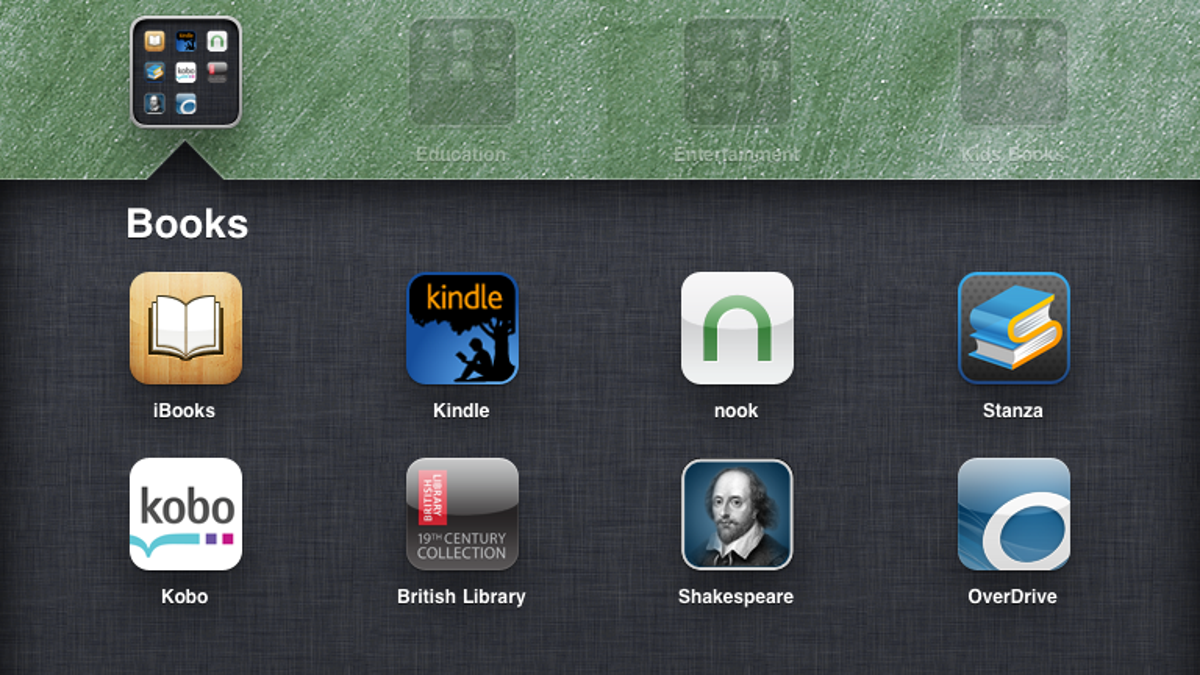What Apple's latest rules change means for Kindle, Nook, and Kobo e-reader apps
Apple's recent tweak to its in-app subscription rules has big implications for e-reader apps. What's it all mean?

Apple giveth and Apple taketh away.
Today, Apple decided to give a little, as it made some significant tweaks to its in-app subscription rules that impact the fate of e-reader apps.
Apple had reportedly set a deadline of June 30 for developers to alter their apps to reflect the new terms for subscriptions in the Apple Store, which required companies to give Apple a 30 percent cut on sales their apps generate.
In the past, e-reading apps Kindle, Nook, and Kobo have avoided paying the cut by sending customers to a Web-based interface outside the app. When Apple issued its App Store subscription rules last February, however, it made conditions far stricter. The company would require third-party developers to sell any available content from within the app--sales from which siphon Apple's standard 30 percent commission that it was otherwise not receiving from the Web-based purchases. Moreover, the vendors couldn't raise the in-app version of the price to help defer the money they'd now owe to Apple--the rules further stipulated that the in-app price must be at "the same price or less than it is offered outside the app."
In other words, the vendor--Amazon, Barnes & Noble, and so forth--would need to sacrifice 30 percent of all sales (and subscription) transactions, effectively requiring them to sell at a loss. (The February changes were due to take effect on June 30.)
As one angry developer of the iFlow Reader app noted as his company went out of business, Apple's new rules were impossible to comply with for many companies and that Apple was basically sending an "eviction notice" to digital book sellers.
However, Apple's latest amendment to its in-app subscription rules appears to have loosened the noose up while still choking off sales.
Let's start with the old rules:
11.13 Apps can read or play approved content (magazines, newspapers, books, audio, music, video) that is sold outside of the app, for which Apple will not receive any portion of the revenues, provided that the same content is also offered in the app using IAP [in-app purchase] at the same price or less than it is offered outside the app. This applies to both purchased content and subscriptions.
Now here are the new updated rules:
11.13 Apps that link to external mechanisms for purchases or subscriptions to be used in the app, such as a "buy" button that goes to a web site to purchase a digital book, will be rejected.
11.14 Apps can read or play approved content (specifically magazines, newspapers, books, audio, music, and video) that is subscribed to or purchased outside of the app, as long as there is no button or external link in the app to purchase the approved content. Apple will not receive any portion of the revenues for approved content that is subscribed to or purchased outside of the app.
As it stands, you currently can't buy e-books from the Kindle, Nook, and Kobo apps, anyway. Instead, they have a single "shop for books" button that boots up the Safari Web browser, where you can purchase what you please from Amazon, Barnes & Noble, and Kobo.
According to the new rules, that shopping button will no longer exist. In other words, there can't be any link out to a non-Apple store on the Web. You will, however, be able to read any e-books that you've purchased directly from those e-bookstores.
Translation: The Kindle, Nook, and Kobo apps will simply become e-reading apps that will allow you to sync your digital libraries across devices.
Using the Kindle app and iPad as an example, now instead of accessing the Kindle Store by clicking the "Shop in Kindle Store" in the top right corner of the home page in the app, you'll have to manually open the Safari browser, buy an e-book, then return to the Kindle app to retrieve that purchase by resyncing your account. It's one extra step, but not the end of the world.
When you buy an e-book in the Kindle Store online (on Amazon's Web site) from your computer, you're given the choice of sending the e-book to whatever Kindle-enabled device you've linked to your Amazon account. One would think that you'd still be able to send content to, say, your iPad, but we haven't been able to confirm that with Amazon. (We put out e-mails to all three companies but have yet to hear back about the rules change and what it means to their apps).
The long and short of it is while you can expect some changes (we don't know exactly when those changes will happen, but as we said, Apple's original deadline was June 30), if you use an e-reader app on your iOS device, you'll be able to continue accessing your library and presumably update it. But it also appears that Apple's iBooks will be the only e-reader app that will have shopping links in the app.
Can this all change tomorrow? Sure. Apple could go ahead and update its rules again. And there's little bit of ambiguity in the phrase, "Apps can read or play approved content," which leaves the door open for Apple to reject certain content for failing to living up to Apple's rules.
For now, though, it seems that at least Apple has softened up just enough to avert what probably would have resulted in serious backlash from its users.

